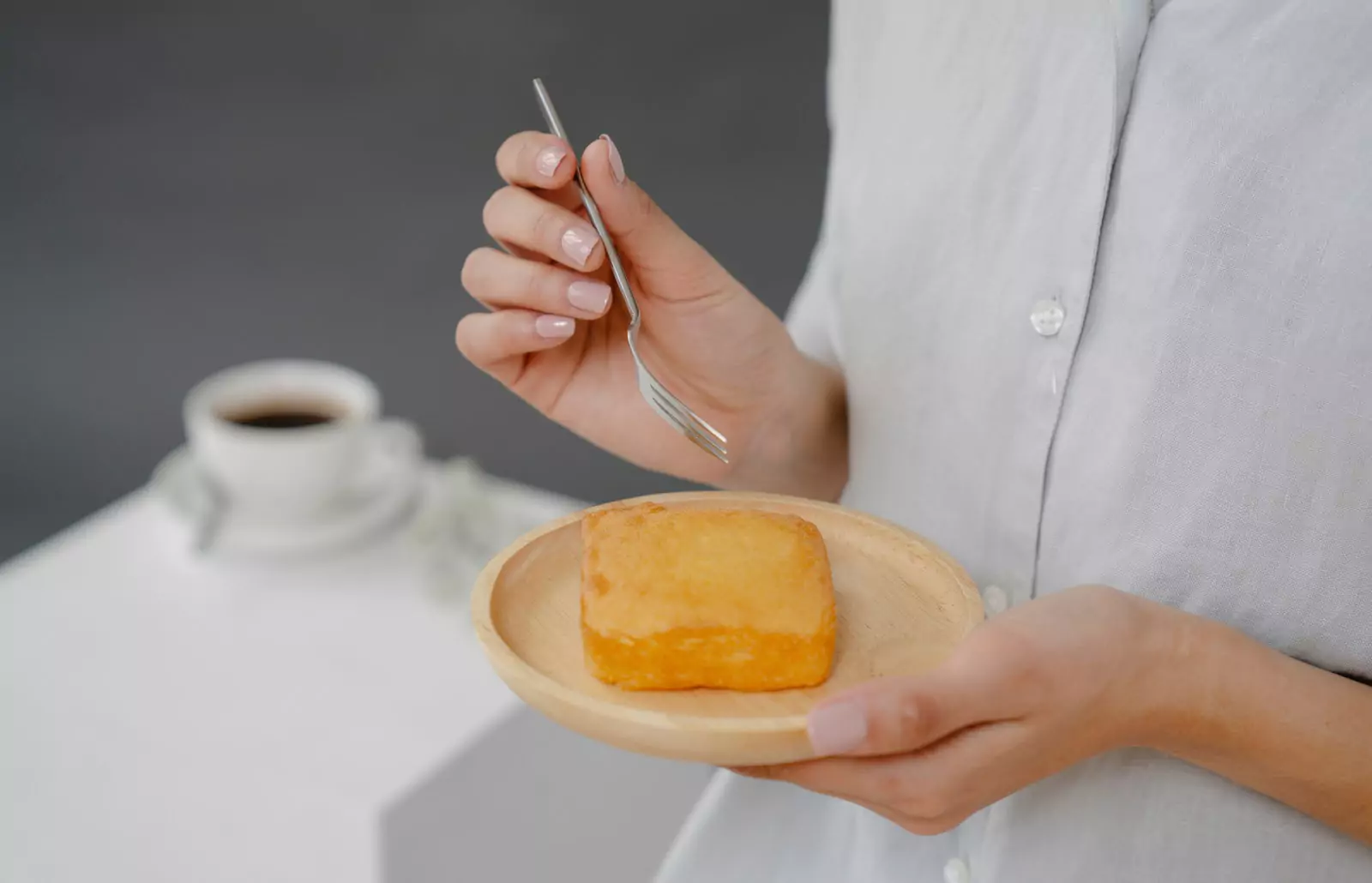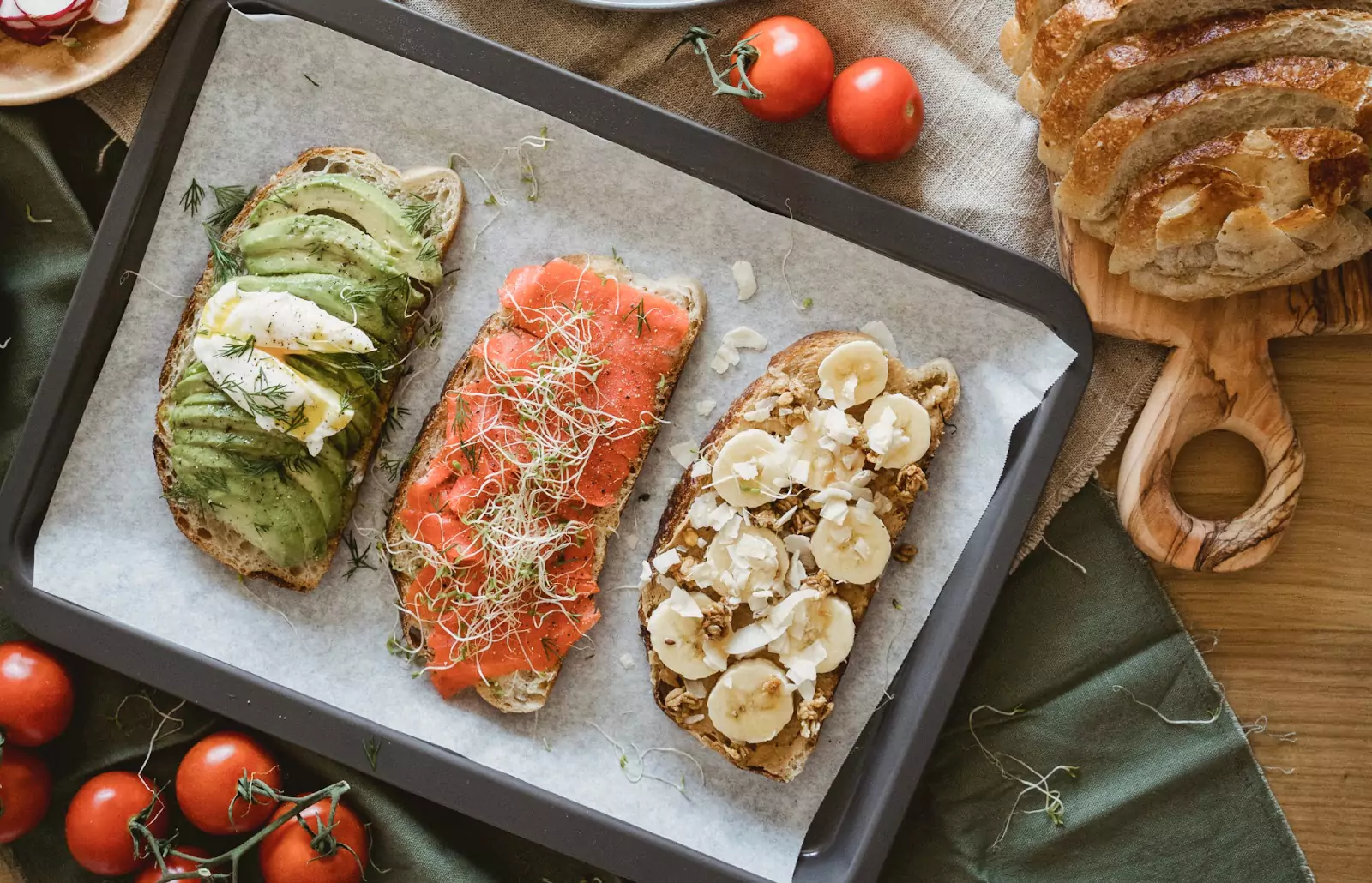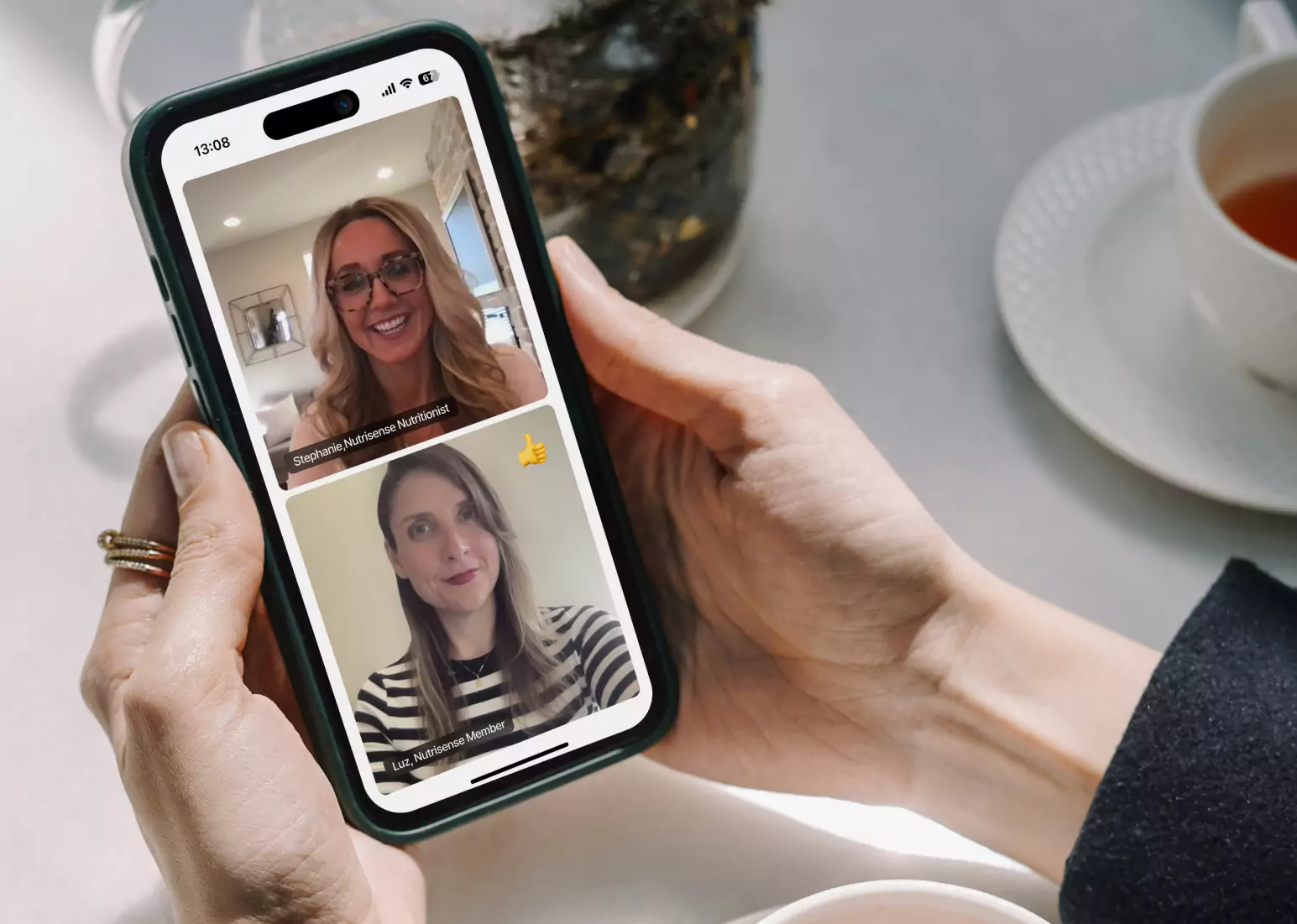How to Beat Sugar Cravings [Advice and Tips From Dietitians]

Key Takeaways
Like most people, you've probably experienced sugar cravings at some point in your life. But don't blame yourself for them! We're hard-wired to seek energy-dense foods, and unfortunately, our world is saturated with these foods. So it can be challenging to manage the cravings you have for them. But whether you're trying to optimize your diet for good health, to meet weight loss goals or simply to boost energy, addressing your sugar cravings is a good idea.
You don't have to worry too much about your sugar cravings if you can get by on properly portioned sweet foods. But if you start obsessing and/or binging on sugar, it may be time to re-evaluate your approach. We're going to explain a little about why sugar addictions are so hard to kick, and give you some tips and tricks from our dietitians here at Nutrisense to help you beat the cravings.
Are Sugar Cravings Actually Considered an Addiction?

There's still ongoing research about the existence of sugar addiction. However, there is certainly good evidence that it exists. Before we dive into it, let's first look at the difference between cravings and addiction. A craving is an intense desire for something. On the other hand, addiction is a condition developed by compulsively consuming a substance despite the adverse side effects.
Cravings can turn into addictions if you don't manage them properly, but food cravings are not always a sign of concern. You can develop a craving if you have a nutritional deficiency or self-imposed food restrictions. Something to keep in mind is that your body naturally craves what's known as hyperpalatable foods. Hyperpalatable foods are easy to digest and high in sugar, fat, and salt.
From an evolutionary perspective, it makes sense to crave these foods since finding food was a challenge in the past. But in today's world, there's an overabundance of food. So it's normal to naturally gravitate towards calorically dense foods. Animal and human studies have shown that hyperpalatable foods can stimulate the brain's reward center, influencing your decisions. This creates a positive feeling, making you want to keep eating this food over and over again.
When you're full, you release hormones such as glucagon-like peptides, cholecystokinin, and leptin. And when you're hungry, you release the hormone ghrelin. Eating hyperpalatable foods can interfere with these hormones, making you experience cravings even when you're actually full. Animal studies have shown that consuming higher fat and sugar foods can reduce stress, inducing cravings for these foods.
So, you can see that there are certainly some foods that induce cravings. The degree to which these foods are addictive (like alcohol and drugs) is still unclear. Both hyperpalatable foods and substances can affect the brain by triggering dopamine release and stimulating the reward-learning regions of your brain. They also both create a tolerance, increasing the amount you need as time goes on. Both are also hard to quit because they induce a hyperactive response. For example, a review of the clinical trials found that sugary foods cause similar changes to the brain as addictive substances and produce negative withdrawal symptoms when they're taken away.
Top Reasons People Experience Intense Sugar Cravings

So, you know now that sugar cravings are real and that they may lead to addiction. But why do you crave sugar? What does it do to your body that makes you want more? There are many answers here. First, here's a quick list of reasons why you experience sugar cravings:
- Dips and fluctuations in blood sugar
- Too many carbs and not enough healthy protein or fats
- Negative sugar-related lifestyle habits
- Nutrient deficiencies; specifically magnesium
- High stress
- A lack of sleep
- Social environment
To learn more about why you crave sugar, check out this article.
Tips to Help Curb Your Sugar Cravings

Many factors can increase sugar cravings, and both biological and social factors play a role. Sugar has a powerful impact on our brains, but that doesn't mean you must succumb to every craving. So what can you do to curb them? We’ve got a list of tips to help you out. But first, here’s how to combat some of the reasons we already gave you above:
If you have dips and fluctuations in blood sugar
- Consider changing up the frequency of your meals and focusing on protein. Smaller, more frequent meals that are rich in protein are a good option. When you consume a larger quantity of carbs at a given time, your glucose may crash to lower than pre-meal values. This can result in more cravings for sugar.
- Unsure if your glucose is dipping too low? Consider using a CGM to track it!
If you're eating too many carbs and not enough healthy fats or protein
- Swap sugar-sweetened beverages with carbonated water. You still get all the bubbles without the sugar!
- Eat protein before carbs. Protein can help blunt the glycemic response, reducing crashes in blood glucose.
- Focus on eating protein with all your meals. If you eat three meals a day, aim for 20 to 30 grams per meal.
- Focus on whole sources of carbs rather than processed ones. Whole sources of carbs (like fruit) contain fiber that can slow the release of glucose in the bloodstream. This can help reduce blood sugar swings.
- Start the day with a high-protein breakfast like eggs. Consuming an early meal can help keep glucose stable throughout the day. This is because after a long fast, you're less tolerant of carbohydrates. This means you can spike higher than ideal—eating a high-protein meal earlier in the day can mitigate these swings.
To combat negative sugar-related lifestyle habits
- Actively look for the sugar content on nutrition labels. Try avoiding foods that contain five grams of added sugar per serving. You can also consider tracking calories to see how much of this added sugar you're consuming. Women should aim to consume <25 grams of added sugar per day. Men should aim to consume <36 grams of added sugar per day.
- Prioritize whole, unprocessed foods as much as possible.
- Integrate more movement in your day. More activity can help mitigate glucose spikes, reducing crashes and cravings for sugar.
- Drink water. Aim for at least 50 ounces per day. Dehydration can drive up hunger, increasing sugar cravings.
If you have nutrient deficiencies (and specifically magnesium deficiencies)
- Talk to your doctor about testing your nutrient levels. If you do take a magnesium supplement, remember to take it with food!
- Some examples of magnesium-rich foods include: nuts and seeds (almonds, cashews, pumpkin seeds), legumes (black beans, edamame), whole grains, greens (spinach) and dark chocolate.
If you're feeling stressed
- Try to recognize when your sugar cravings hit most. Are they strongest during a stressful meeting? After a family feud? If so, you may be using sugar to cope with stress.
- If you find a correlation between your stress and sugar cravings, find something to reduce this stress. Go on a walk, call a friend, or meditate!
If lack of sleep is to blame
- Try to carve out a good eight hours of sleep every night.
- Take a walk after dinner to help lower glucose. Remember, there's a correlation between high glucose and poor sleep.
If your social environment is at fault
- Try choosing meals centered around protein at a restaurant.
- Eat something before going out to reduce sugar cravings.
- Skip higher carb/higher sugar alcoholic beverages such as beer and/or cocktails.
- Focus on liquor and club soda mixes that are low in sugar.
- Pack your own lunch, so you're not forced to eat any unhealthy takeout.
Still need more help with those pesky cravings? Here’s ten tips from the registered dietitians at Nutrisense to help you beat your sugar cravings:
1. Identify Obsessive Food Behaviors Around Sugar

If you notice a sudden increase in your sugar cravings or find it's becoming overwhelming to try and control them, it's time to jump into action. Sugar cravings can result in an overconsumption of sugar, which can drive up blood sugar. And there are various health consequences to chronically high blood sugar. Talking to a therapist and/or a registered dietitian can be a helpful way to begin addressing the issue.
2. Stock Your Fridge with Easy-To-Make Healthy Meals

If you experience a lot of sugar cravings, it can be helpful to stock the fridge with healthy meals. Planning healthy meals in advance can keep you motivated to choose healthier options. Center your meals around protein, non-starchy vegetables, and a small side of carbs. Adding a healthy dose of protein won't take too much time and effort either.
You can usually cook proteins like chicken breasts, steaks, tofu, and fish in a skillet over high heat in under 10 minutes. To quickly cook vegetables, you can use the microwave. For example, partially covered green beans with one tablespoon of water (remember to use a microwave-safe bowl!) will cook within five to eight minutes. You can cook starches like sweet potatoes in the microwave too. Wrap them in a wet paper towel and microwave on high for five to eight minutes or until you can pierce them with a knife.
3. Identify Your Daily Habits That Create Constant Sugar Cravings

Habits can be hard to break, but they're built over time. Certain habits can predispose you to craving sugar. Here are just a few:
- Consuming soft drinks.
- Social pressure, like being around people who overconsume sugar and hyperpalatable foods.
- Using sweets like chocolate to cope with stress.
- Not having access to fresh, whole foods.
Once you identify the habits that you're having the most trouble with, you can develop a plan to get back on track to optimize your health.
4. Work to Change Sugar Consumption Habits

There are certain ways to trick your body out of an intense sugar craving. But before you try any of them, it's essential to recognize why you're craving sugar. For example, if you're using sugar as a coping mechanism, you should replace sugar with a better habit. Consider what you're trying to cope with too. Things like stress, anxiety, and boredom may prompt you to turn to sugar. Try healthy coping mechanisms like meditation, exercise, or eating a piece of fruit instead of resorting to sugar.
Another way to deal with sugar cravings is to pair up with someone you trust. If you have someone close to you working through the same problem, you're more likely to kick the cravings. The two of you can hold each other accountable and celebrate victories together.
Cutting out triggers that prompt you to consume sugar can also be helpful. Notice that you always eat candy when it's in the house? Remove the temptation! Always drop into the candy store when you drive by it? Try changing your route (if possible, of course) so you don't have to pass it as often.
5. Consider An Initial Increase in Sweeter Vegetables and Fruits

For some people, slowly transitioning away from processed sugar is a helpful way to create sustainable healthy habits. One way to make this transition easier is to incorporate sweeter vegetables and fruits into your diet. Sweet potatoes, winter squash, carrots, apples, pears, and berries are all great options. These foods are healthy, nutrient-dense options that are also sweet. So they act as an excellent substitute for more processed sugars.
Once you add more fruits and vegetables into your diet, try focusing on lower glycemic fruits and vegetables. A GI index can help determine what foods raise glucose the highest. Combining high-carb foods with protein and fat can also help with glycemic control.
You don't have to eliminate all processed sugars and hyperpalatable foods during this transition. If you have an issue with sugar and try to go cold turkey, you're more likely to binge. Small steps are key. For example, if you usually drink four sodas per day, try cutting back to just three. Once you feel comfortable with this, try cutting down to just two a day. Or, replace that soda with a sweet fruit to help curb cravings. Making healthy and sustainable lifestyle changes is a process, so remember that it will take some time!
6. Address Severe Stress That Can Cause Sugar Cravings

Coping with stress in healthy ways can help reduce sugar cravings. When you're stressed, you produce a hormone called cortisol, which stimulates the production of glucose. Stress can also cause glucose to drop too low, increasing sugar cravings.
7. Drink More Water and Improve Overall Hydration Levels
Adequate water consumption is vital to prevent sugar cravings. It can also help to curb hunger, reducing sugar cravings. So, remember to stay well-hydrated—consider reaching for a glass of water the next time you have a craving for sugar!
8. Make Sure You're Eating Enough Protein and Healthy Fats

Eating enough protein and fat can help mitigate glucose spikes. When you reduce glucose spikes, you're less likely to experience blood sugar crashes. Focusing on experiencing fewer blood sugar crashes is an excellent way to reduce your glucose cravings. Center your meals around protein-rich foods such as poultry, fish, meat, eggs to help keep your glucose balanced. Trying a metabolic diet can also help out here.
9. Concentrate on Your Blood Sugar Levels and Metabolic Health
It's essential to regularly test your blood sugar levels to ensure you're not prediabetic or at risk of prediabetes. Prioritize visiting your doctor annually for a standard lab test. You can also use a continuous glucose monitor (CGM) to better understand your metabolic health.
10. Prioritize Getting Good Sleep

There is a relationship between sleep, blood sugar, stress, and overall health. When you feel stressed, your glucose can rise, and high glucose levels can make it challenging to sleep well. When you sleep poorly, your ability to recognize hunger and fullness can be compromised. This can result in overeating sugar-rich foods.
Here are some ways to ensure you get a good night of sleep:
- Develop a regular bedtime. Going to bed and waking up at the same time (within 30-60 minutes) every day is a good habit, even if you don't suffer from sugar cravings.
- Maintain a dark bedroom at night so you can sleep better.
- The temperature of your bedroom matters too, so make sure it's cool at night.
- Avoid caffeine and alcohol in the evening.
- Wind down before bed. Light stretching, journaling, taking a bath, and/or reading are all excellent ways to wind down after a long day at work.
- Avoid screen time at least 30 minutes before you go to bed.
- Remove clock faces from the bedroom as they can trigger anxiety for some people.
Find the right Nutrisense programto turn insight into progress.
Go Beyond Glucose Data with Nutrisense
Your glucose can significantly impact how your body feels and functions. That’s why stable levels are an important factor in supporting overall wellbeing. But viewing glucose isn't enough. Nutrisense, you’ll be able to learn how to use your body's data to make informed lifestyle choices that support healthy living.
One-to-one coaching
Sign up to access insurance-covered video calls to work with a glucose expert: a personal registered dietitian or certified nutritionist who will help tailor your lifestyle and diet to your goals.
Monitor and measure what matters
With the Nutrisense CGM Program, you can monitor your glucose with health tech like glucose biosensors and continuous glucose monitor (CGM)s, and analyze the trends over time with the Nutrisense App. This will help you make the most informed choices about the foods you consume and their impact on your health.
Find your best fit
Ready to take the first step? Start with our quiz to find the right Nutrisense program to help you take control.

Kara Collier is a registered dietitian nutritionist and certified nutrition support clinician who is passionate about reshaping how we approach prevention, behavior change, and metabolic health. A Forbes 30 Under 30 honoree, she’s helped over 150,000 people improve their metabolic health using tools like continuous glucose monitors and behavior-focused nutrition strategies. Kara has been featured by Forbes, UC Berkeley, and HLTH, and has appeared on top podcasts like Mind Pump and The Genius Life.



.webp)
